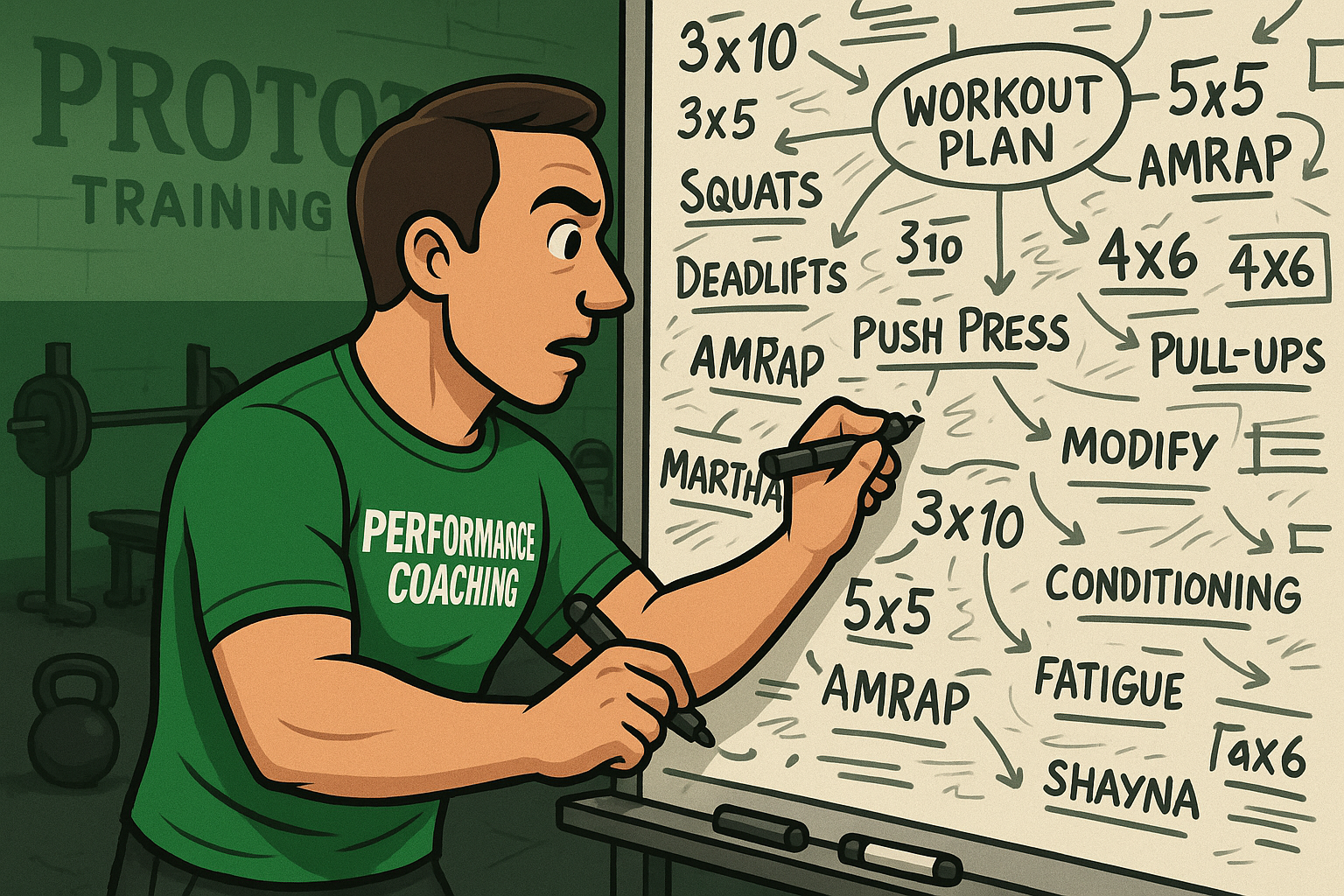Ask a Pro: Bianca Calderone
Mike Collette • December 21, 2024
Success as a Student Athlete and Beyond
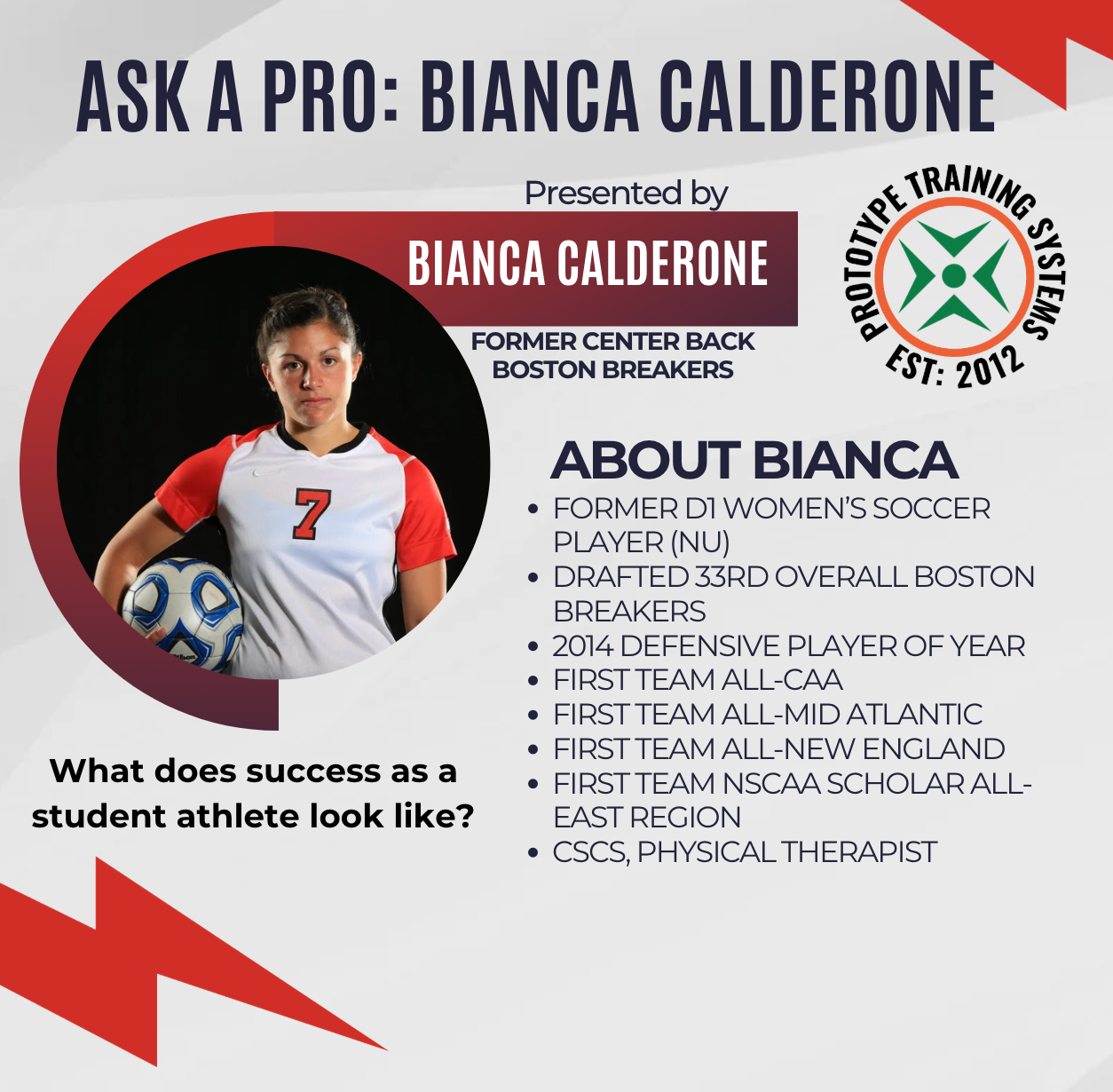
This week, we had the privilege of hearing from Bianca Calderone, a former center back for the Boston Breakers and D1 soccer player at Northeastern University. She shared her insights on what it takes to succeed as a collegiate athlete and beyond. Bianca provided valuable perspectives on navigating the challenges young athletes face, offering the group a deeper understanding from someone with years of experience in the process.
As many of the athletes we work with are preparing to transition to college, there are a lot of unknowns. Playing at the collegiate level can be a major adjustment, and Bianca shared a crucial piece of advice a coach once gave her when choosing where to go: “Consider whether you’d still be happy in this environment, even if you couldn’t play.”
Self-Belief vs Humility
The transition from high school to college soccer can be a real eye-opener, especially for athletes who were stars in high school. Suddenly, you're surrounded by other players who are just as skilled, if not more. Bianca stressed that it’s crucial to shift your mindset and embrace the challenge. You have to walk into that environment believing you belong and carrying the ego that says, “I’m here to compete and be the best.” But at the same time, you need the humility to acknowledge that you’re always evolving. It’s not about being the best right away—it’s about being ready to learn, grow, and challenge yourself every day. Confidence will fuel your drive, but humility will keep you hungry and adaptable.
Bianca also shared a story about how a coach once compared her to another player she had grown up playing against. Her coach said, “The difference between you and her isn’t your skill on the field—it’s that she thinks she’s the best. You need to think you’re the best player out there, you need her ego.” This perspective was eye-opening, especially considering how often we associate ego with arrogance. In this case, Bianca realized that having a strong belief in yourself—what some might call ego—could actually be a superpower that helps propel you forward.
Bianca also made an excellent point about competition, emphasizing that the true challenge is not just beating the player next to you, but pushing yourself to be better than you were yesterday. It’s about setting a standard for personal growth and improvement that isn’t defined by the competition, but by your own drive to evolve and reach new heights.
Bouncing Back
When Bianca tore her ACL during her freshman year of college, it was a devastating blow, not just physically but mentally. Injuries, especially ones that sideline you for an entire season, force athletes to face a tough choice: succumb to self-pity or rise above it.
Bianca spoke openly about the mental struggle she faced after her injury. For a while, she was in denial, consumed by mental chatter wondering if she’d ever be able to play again. It wasn’t until she came to terms with the injury—accepting that this was her reality—that she was able to refocus and dial up her discipline. Once she did, she had a moment of clarity: “I want to play. I do love playing.” From that moment forward, she committed herself fully to the recovery process, showing up to the weight room every day with renewed determination.
In moments like these, it’s easy to feel overwhelmed, but Bianca emphasized the importance of focusing on small, manageable steps. This idea, reinforced by her career in physical therapy, has been a key part of her approach. By breaking down the recovery process into smaller goals, the bigger picture becomes clearer, and progress feels more attainable.
She also shared a candid reflection on the emotional side of being sidelined. Watching her team play while she couldn’t be out there was tough—there was a part of her that didn’t want the team to succeed without her. It’s a natural feeling, wanting to feel like a necessary component of the team’s success. But Bianca pointed out that this is an important moment to step back and reassess. Even when you’re not on the field, you have a unique opportunity to be a cheerleader for your teammates and contribute in ways that aren’t always immediately visible.
Key Takeaways
Throughout the conversation, Bianca shared three key principles that have shaped her life after sports, guiding her as both a business owner and a mother:
Grit and Self-Belief
– To get through tough times, you need to believe in yourself. As she puts it, "You have to have the ego to say, 'I can do this.'"
Small Goals
– Break big goals into manageable steps. "I can get two clients, then four... and celebrate each milestone along the way."
Compete with Yourself
– This requires positive self-talk and a mindset of continuous improvement. It’s about wanting to “one-up” yourself, not just beat the person next to you.
Bianca’s journey is a powerful reminder that the lessons we learn on the field extend far beyond it. Resilience, discipline, and self-belief are timeless tools, no matter where life takes you.
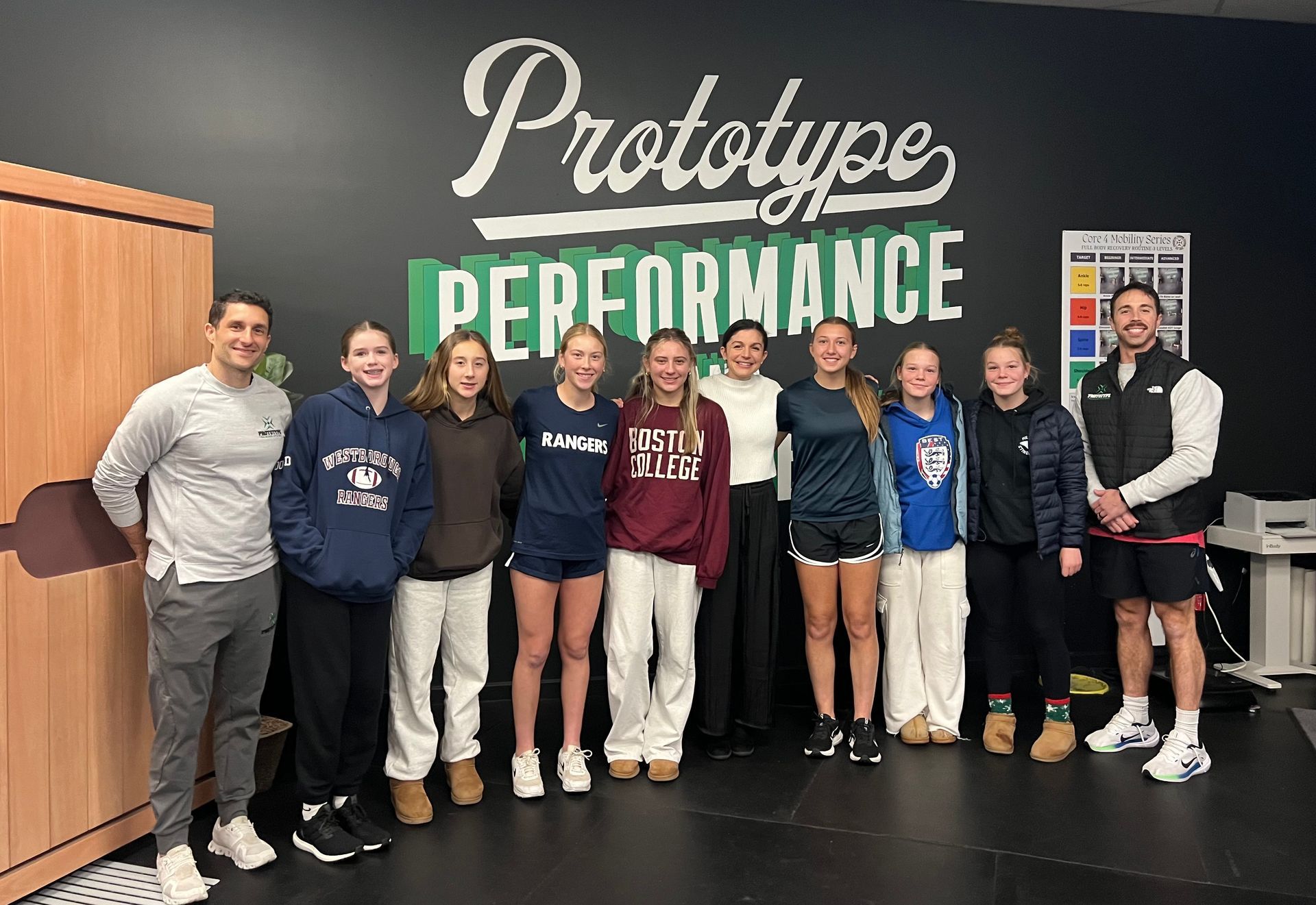
Previous Blogs
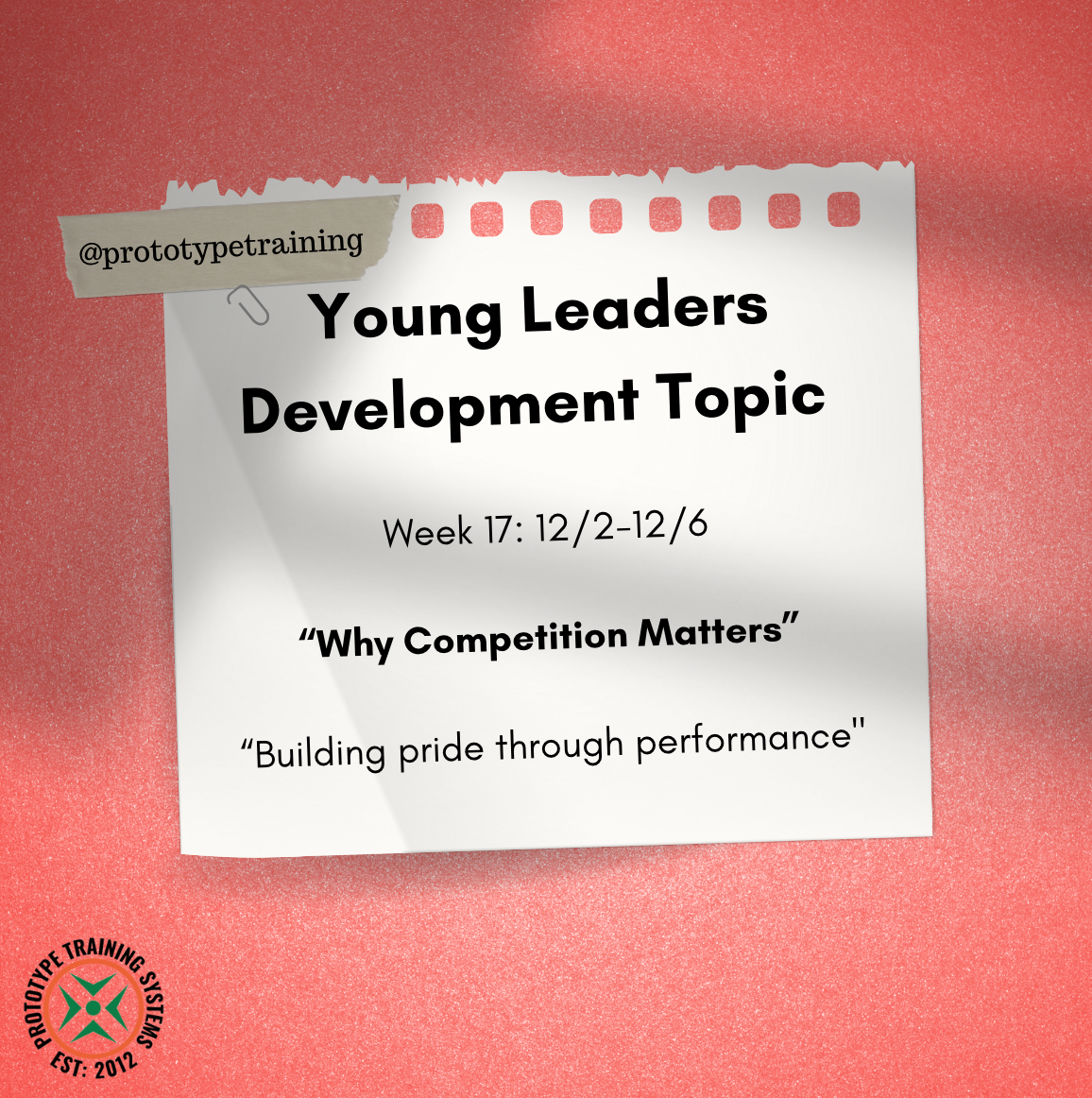
Yesterday was a great reminder of what a little friendly competition can do. We set up a simple 1-v-1 game: kids had to sprint, tap two cones, and race back to knock over a foam roller. Nothing fancy, just movement, focus, and a clear goal. But something cool happened. The second it became head-to-head, the energy shifted. Kids were locked in. They ran harder. They pushed themselves—not because they were told to, but because someone else was giving it their all too. Even the kids watching got invested—shouting encouragement, clapping for effort, reacting to every close finish. That sense of shared experience, of community rooted in challenge, is exactly what youth development should be about. It was a perfect example of how competition, even in its simplest form, can bring out motivation and effort . Not for a prize, but just for the challenge of it. More Than a Game: The Real Value of Friendly Competition In today’s world of participation medals and well-meaning “everyone wins” culture, it’s easy to misunderstand the role of competition. But when designed thoughtfully and guided with intention, competition doesn’t diminish self-worth—it enhances it. According to a 2019 study published in Frontiers in Psychology, structured competition can lead to higher intrinsic motivation, improved self-esteem, and a greater sense of personal accomplishment in youth participants (Bonfiglio et al., 2019). When kids compete, they learn that effort yields results. They learn how to win graciously—and perhaps more importantly—how to lose with resilience. They discover the value of hard work, discipline, and focus. They get to ask: “How fast can I be?” “How far can I push myself?” And, “What happens if I try just a little harder?” The Pride in Performance There’s a moment—right after a child finishes a race, or a round of a competitive game—where they catch their breath, stand a little taller, and smile. Whether they won or not is almost secondary. What matters is that they showed up and gave their best effort. That sense of pride? That’s not vanity. It’s the birth of confidence. And when that confidence is built through movement, through play, through sweating and trying and doing—it sticks. Not just in sport, but in school, at home, in friendships, and beyond. Final Thoughts Competition, when framed the right way, helps kids build confidence, stay motivated, and take pride in their effort. It’s not about winning — it’s about showing up, trying hard, and learning what they’re capable of. At its best, competition doesn’t separate kids — it brings them together, showing them how to push themselves while supporting each other along the way.
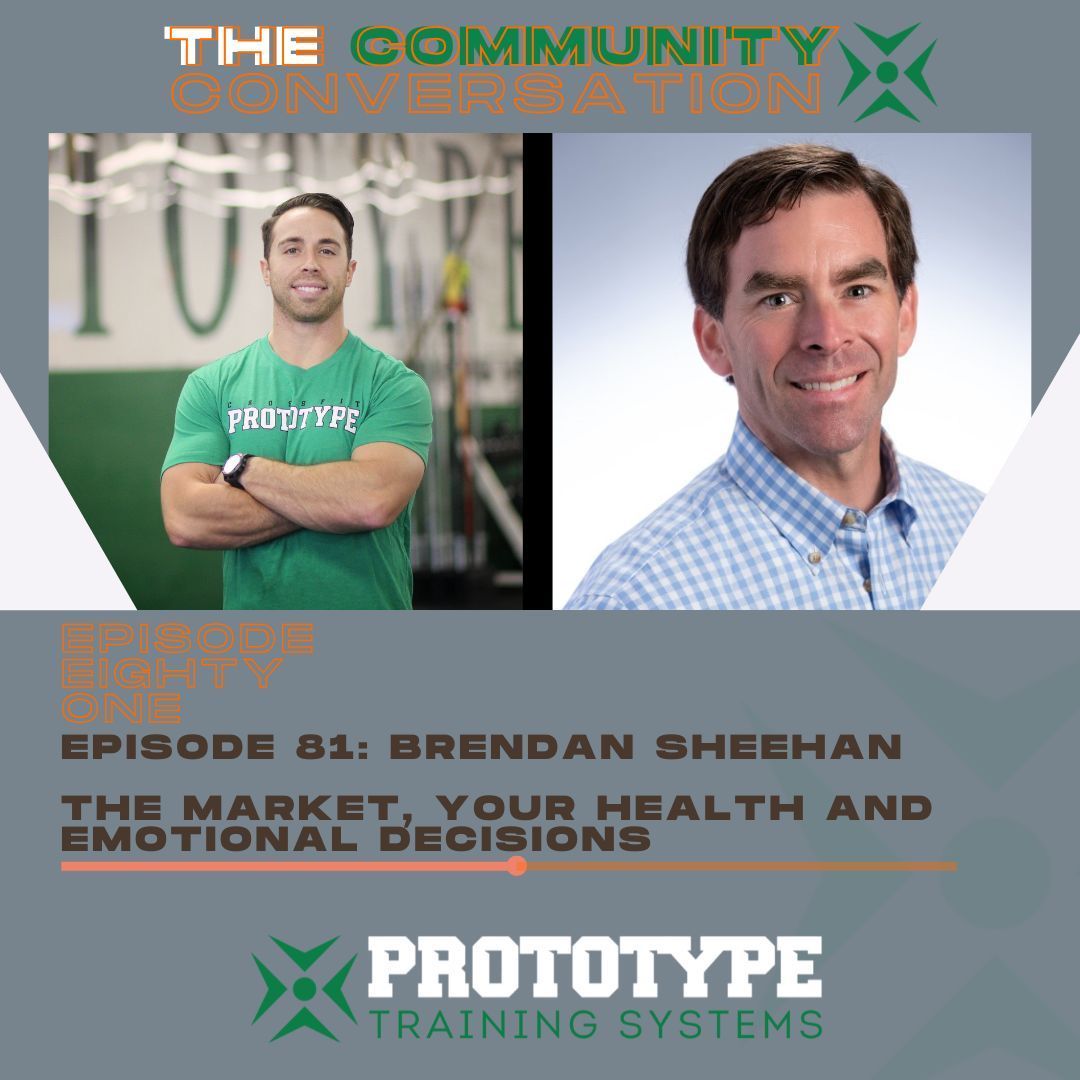
It’s no secret — we’re living in a world that feels increasingly volatile. Financial markets are unpredictable. The news cycle is overwhelming, social media noise is constant and it's harder and harder to sort through what's real and what's not. And when uncertainty rises, it's human nature for people to start making emotional decisions. Being in the fitness industry for close to 20 years and operating Prototype Training Systems since 2012, I've seen this happen time and time again — not just in the stock market — but in our gym community. When we feel stressed financially (and trust me, i've been there as an entrepreneur), one of the first things they often cut is their investment in their health. Cancelling the gym. Skipping workouts. Pressing pause on coaching or training. We can go into a frenzy of what needs to be prioritized and what doesn't, and often it's rooted in anxiety and fear. On the surface, it makes sense: "Let me tighten up my budget until things feel safer." But here’s the truth — it’s completely backwards . Emotional Decisions Rarely Lead to Positive Outcomes In a recent conversation I had with Brendan Sheehan, founder of Waymark Wealth Management (and one of our community business sponsors), we talked about this exact thing. As we are facing that uncertainty now in the market. Click the link to listen to the full podcast! Brendan was sharing when the market drops — whether it’s 5%, 10%, or more — people panic. But the data shows this happens all the time. He shared that "the m arket dips of 5-10% happens three times a year on average." Dips of 10-20%? Happens at least once a year. It’s not unusual — but when emotions take over, we make decisions that can hurt long-term. And this same pattern can show up in health and fitness. Your Health is Not a Luxury — It’s Essential Let’s be real — when life feels hard, stressful, or uncertain, you need your health more than ever. Exercise isn't just about aesthetics or performance — it's your anchor. Working out helps you regulate stress, sleep better, stay clear-headed, and avoid the emotional roller coaster that uncertainty brings. Cutting your health investments when things get tough is like saying: "The storm is coming... so I'm going to throw away my umbrella." It doesn’t make sense, but this what happens when emotions are high, it's REALLY hard to make logical decisions. We can get into a binary mode of thinking... then we take action which often isn't fully thought out. The Vicious Cycle: Stress → Cut Health → Decline → Regret Here's the common pattern we’ve seen over the years... and I would argue is common in every gym across the country... Things get tough financially or emotionally. We go into "panic" mode... start to take action. People cut their gym membership or stop exercising. Maybe you over narrate it's not worth it... maybe you over narrate I'll just do it on my own and change my entire routine... or maybe you think it will only be very short term. Then, stress increases. Energy drops. Sleep gets worse. Health declines — physically and mentally. Time passes... regret kicks in. "I wish I hadn't stopped. Now it’s even harder to get back ." Sound familiar? It's a vicious cycle and REALLY hard to break. We’ve seen it over and over — and we’ve helped people climb back out of it. But we’d rather help you avoid that spiral in the first place. What Should You Do Instead? Have faith in your routine and take a second to pause before making a major life change. Double down on habits that ground you — like fitness, community, and nutrition. Talk to a coach. Share what’s stressing you out — we’re here to help. Be curious — ask questions before making big decisions. Remember: health is not the problem — it’s the solution. Final Thought: Uncertainty will always be part of life. Markets go up and down. Challenges will come and go. But the best investment you can make — in any economy — is in your physical and mental well-being. At Prototype Training Systems, we’re more than a gym. We’re a community that helps people stay grounded, consistent, and healthy — no matter what’s happening outside our walls. If you’re feeling the pull to cut your health in hard times — let’s talk. Book a Free Goal Review Session with a coach... seriously, we're here to help. We’ll help you navigate uncertainty the right way — by staying strong, staying consistent, and investing in yourself.
Climb to New Heights
Prototype Training Systems is more than a gym - it is a lifestyle. Join us today!

